【绝对精品】英语语法15-句子介绍-Sentences
sentences是什么意思_sentences中文翻译_常见例句
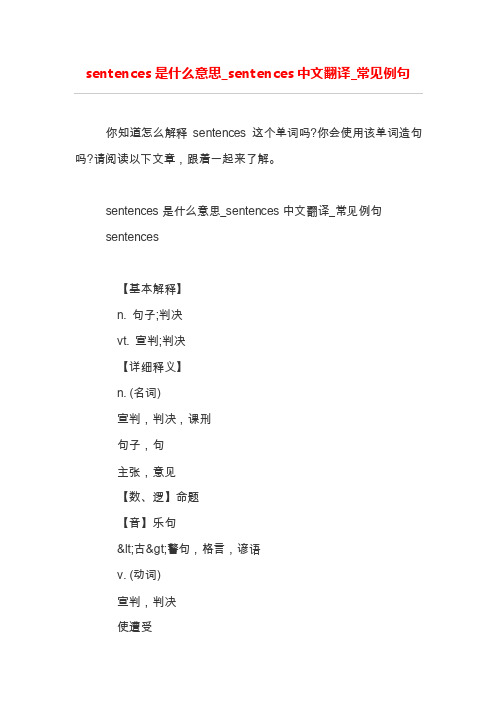
sentences是什么意思_sentences中文翻译_常见例句你知道怎么解释sentences这个单词吗?你会使用该单词造句吗?请阅读以下文章,跟着一起来了解。
sentences是什么意思_sentences中文翻译_常见例句sentences【基本解释】n. 句子;判决vt. 宣判;判决【详细释义】n. (名词)宣判,判决,课刑句子,句主张,意见【数、逻】命题【音】乐句<古>警句,格言,谚语v. (动词)宣判,判决使遭受【常用短语】Key Sentences 重点句子; 关键句; 重点句型; 关键句型Supporting sentences 支持句; 支撑句; 分层次说明理由; 缘由long sentences 长句; 不必要的长句; 长句的翻译; 长句多Compound Sentences 并列句; 复合句; 并列复合句; 复合句Improving Sentences 改进句子; 修改句子; 改进句子题; 句子改进题topic sentences 主题句; 中心句; 分论点; 关键句mandatory sentences 规定刑期; 规定死期Effective Sentences 有效的句子; 句子表达的准确性; 有效句子; 好的句子Common Sentences 常用句式; 惯用句; 常用句式; 常用句型make sentences with 用…造句【常见句型】用作动词(v.)用作及物动词S+~+ n./pron.The criminal had been sentenced.罪犯已被判了徒刑。
No one could understand why the murderer was not sentenced.谁也不理解为什么杀人犯没有被判处徒刑。
用作宾补动词S+~+ n./pron. +to- vThe judge sentenced him to do hard labour.法官宣判他服苦役。
英语语法句子类型
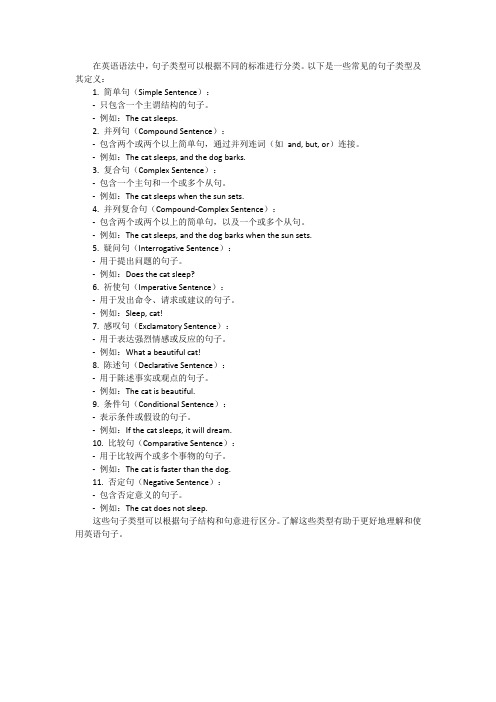
在英语语法中,句子类型可以根据不同的标准进行分类。
以下是一些常见的句子类型及其定义:1. 简单句(Simple Sentence):-只包含一个主谓结构的句子。
-例如:The cat sleeps.2. 并列句(Compound Sentence):-包含两个或两个以上简单句,通过并列连词(如and, but, or)连接。
-例如:The cat sleeps, and the dog barks.3. 复合句(Complex Sentence):-包含一个主句和一个或多个从句。
-例如:The cat sleeps when the sun sets.4. 并列复合句(Compound-Complex Sentence):-包含两个或两个以上的简单句,以及一个或多个从句。
-例如:The cat sleeps, and the dog barks when the sun sets.5. 疑问句(Interrogative Sentence):-用于提出问题的句子。
-例如:Does the cat sleep?6. 祈使句(Imperative Sentence):-用于发出命令、请求或建议的句子。
-例如:Sleep, cat!7. 感叹句(Exclamatory Sentence):-用于表达强烈情感或反应的句子。
-例如:What a beautiful cat!8. 陈述句(Declarative Sentence):-用于陈述事实或观点的句子。
-例如:The cat is beautiful.9. 条件句(Conditional Sentence):-表示条件或假设的句子。
-例如:If the cat sleeps, it will dream.10. 比较句(Comparative Sentence):-用于比较两个或多个事物的句子。
-例如:The cat is faster than the dog.11. 否定句(Negative Sentence):-包含否定意义的句子。
英语语法-句子成分和句子类型

Inverted sentence
总结词
倒装句是一种特殊的句子结构,其中谓语或主语的位置与常 规句子结构相反。
详细描述
在倒装句中,通常将谓语放在句首,而将主语放在句末,以 强调谓语或表达特殊的语意。例如,“Lived a philosopher in that house”这句话中,谓语“lived”被放在了句首,强 调了谓语的动作。
Sentence structure analysis
Subject verb consistency
01
02
03
04
Subject
The subject of a sentence is the person or thing performing the action.
Verb
The verb is the action or state of being
总结词
强调句是一种通过改变句子结构来突出某个单词或短语重要性的句子。
详细描述
强调句通常通过将需要强调的单词或短语放在句首或使用特定的语法结构来突出其重要性。例如,“It was the best of times, it was the worst of times”这句话中,通过使用强调句型“It was”,突出了 “the best of times”和“the worst of times”的重要性。
attribute
定义
句子中修饰名词或代词的形容词或形容词短语。
例句
She is beautiful. (attribute: "beautiful")
02
Sentence type
Simple sentences
定义
sentence的用法及短语
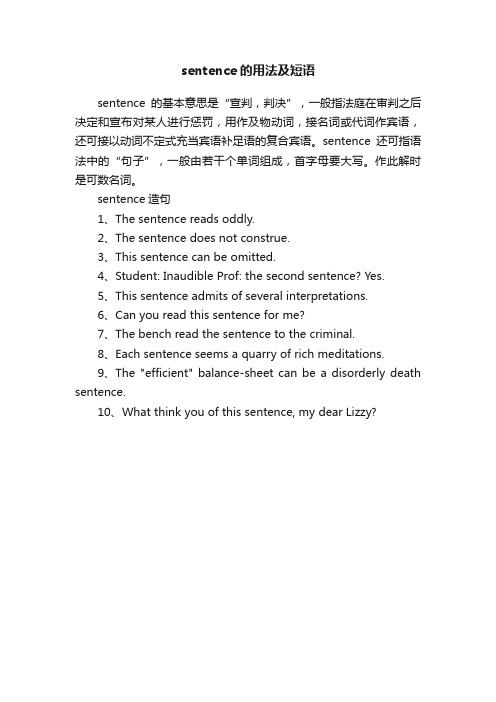
sentence的用法及短语
sentence的基本意思是“宣判,判决”,一般指法庭在审判之后决定和宣布对某人进行惩罚,用作及物动词,接名词或代词作宾语,还可接以动词不定式充当宾语补足语的复合宾语。sentence还可指语法中的“句子”,一般由若干个单词组成,首字母要大写。作此解时是可数名词。
9、The "cient" balance-sheet can be a disorderly death sentence.
10、What think you of this sentence, my dear Lizzy?
5、This sentence admits of several interpretations.
6、Can you read this sentence for me?
7、The bench read the sentence to the criminal.
8、Each sentence seems a quarry of rich meditations.
sentence造句
1、The sentence reads oddly.
2、The sentence does not construe.
3、This sentence can be omitted.
4、Student: Inaudible Prof: the second sentence? Yes.
sentences句子结构
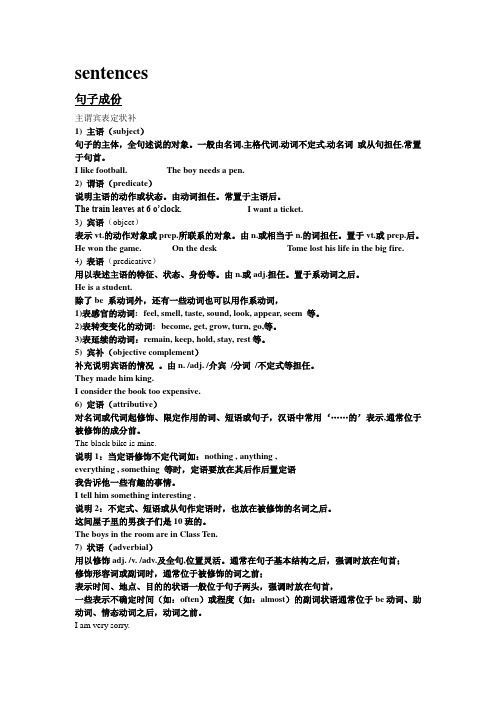
sentences句子成份主谓宾表定状补1) 主语(subject)句子的主体,全句述说的对象。
一般由名词,主格代词,动词不定式,动名词或从句担任,常置于句首。
I like football.The boy needs a pen.2) 谓语(predicate)说明主语的动作或状态。
由动词担任。
常置于主语后。
The train leaves at 6 o’clock.I want a ticket.3) 宾语(object)表示vt.的动作对象或prep.所联系的对象。
由n.或相当于n.的词担任。
置于vt.或prep.后。
He won the game. On the desk Tome lost his life in the big fire.4) 表语(predicative)用以表述主语的特征、状态、身份等。
由n.或adj.担任。
置于系动词之后。
He is a student.除了be 系动词外,还有一些动词也可以用作系动词,1)表感官的动词:feel, smell, taste, sound, look, appear, seem 等。
2)表转变变化的动词:become, get, grow, turn, go,等。
3)表延续的动词:remain, keep, hold, stay, rest等。
5) 宾补(objective complement)补充说明宾语的情况。
由n. /adj. /介宾/分词/不定式等担任。
They made him king.I consider the book too expensive.6) 定语(attributive)对名词或代词起修饰、限定作用的词、短语或句子,汉语中常用‘……的’表示,通常位于被修饰的成分前。
The black bike is mine.说明1:当定语修饰不定代词如:nothing , anything ,everything , something 等时,定语要放在其后作后置定语我告诉他一些有趣的事情。
高中英语单词天天记sentence素材
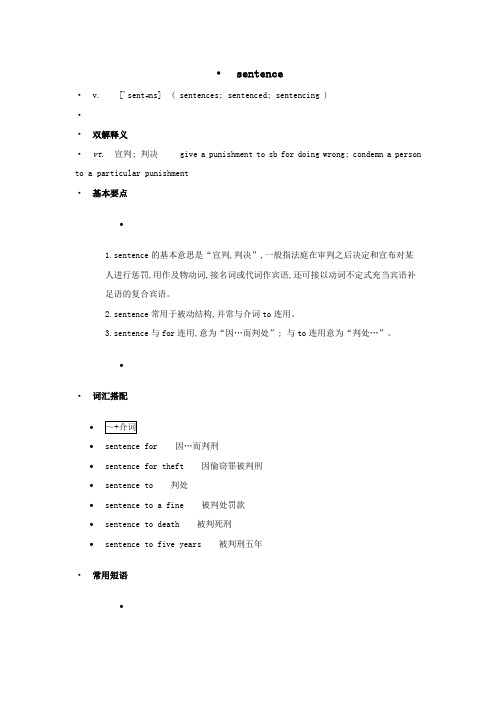
· sentence· v. ['sentəns] ( sentences; sentenced; sentencing )·· 双解释义· vt.宣判; 判决give a punishment to sb for doing wrong; condemn a person to a particular punishment· 基本要点•1.sentence的基本意思是“宣判,判决”,一般指法庭在审判之后决定和宣布对某人进行惩罚,用作及物动词,接名词或代词作宾语,还可接以动词不定式充当宾语补足语的复合宾语。
2.sentence常用于被动结构,并常与介词to连用。
3.sentence与for连用,意为“因…而判处”; 与to连用意为“判处…”。
•· 词汇搭配••sentence for 因…而判刑•sentence for theft 因偷窃罪被判刑•sentence to 判处•sentence to a fine 被判处罚款•sentence to death 被判死刑•sentence to five years 被判刑五年·常用短语•sentence to(v.+prep.)1.处以刑罚 give a punishment to▲sentence sb to sthThe judge sentenced the murderer to death.法官宣判杀人犯死刑。
The judge sentenced him to five years for theft.因盗窃罪法官判处他五年徒刑。
◇ 用于be ~ed结构Then the manager was sentenced to seven years' imprisonment for smuggling.当时那位经理因走私罪被判七年徒刑。
He was tried on the charge of inciting to riot and sentenced to thirty days in jail.他因被指控煽动骚乱而受到审判,并被判处30天监禁。
句子类型陈述句问句祈使句的区分

句子类型陈述句问句祈使句的区分在英语语法中,句子可以分为三种基本类型:陈述句、问句和祈使句。
每种类型的句子在表达方式和语法结构上有着明显的区别。
下面将详细介绍这三种句子类型的特点和区分方法。
一、陈述句(Declarative Sentences)陈述句用于陈述一个事实、描述一个情况、表达一个观点等。
它是对一件事情或情况进行陈述,使读者或听者了解作者的思想或情感。
陈述句的语调通常是平缓的陈述语气。
陈述句的特点:1. 句子结构:主语+谓语+宾语(有时可能没有宾语)。
2. 语调:陈述句语调通常是降调,以表达一个命题或断定。
3. 标点:以句号(.)结尾。
例子:1. She is a teacher.(她是一名老师。
)2. The weather is sunny today.(今天天气晴朗。
)3. I love pizza.(我喜欢比萨饼。
)二、问句(Interrogative Sentences)问句用于提出问题、询问信息或征求对方意见等。
它是通过提问来获取信息的一种方式。
问句的语调通常是上升的疑问语气。
问句的特点:1. 句子结构:疑问词/助动词+主语+谓语(有时谓语和主语顺序会颠倒)+其他(疑问句可包含其他成分)+问号。
2. 语调:问句语调通常是升调,以表达疑问、请求或询问。
3. 标点:以问号(?)结尾。
例子:1. How are you?(你好吗?)2. What time is it?(几点了?)3. Did you finish your homework?(你完成作业了吗?)三、祈使句(Imperative Sentences)祈使句用于提出请求、下达命令、表达祝福等。
它主要用于交流中的指示、要求和建议。
祈使句的语调通常是命令或请求的形式。
祈使句的特点:1. 句子结构:动词(原形)+其他(主语常常省略)+句号。
2. 语调:祈使句可以是命令形式,也可以是请求、建议等形式。
3. 标点:以句号(.)结尾,当语气强烈时可以用感叹号(!)。
语法复习一 :句子(Sentences)幻灯片
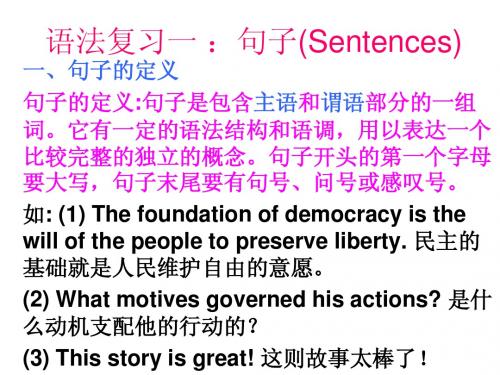
(七)定语:修饰名词或代词的词、短语或从句称为 定语:修饰名词或代词的词、 定语。 定语。 定语可由以下等成分表示: 定语可由以下等成分表示: Guilin is a beautiful city.(形容词) (形容词) China is a developing country; America is a developed country.(分词) (分词) There are thirty women teachers in our school. 名词) (名词) His rapid progress in English made us surprised.(代词) (代词) Our monitor is always the first to enter the classroom.(不定式短语) (不定式短语) The teaching plan for next term has been worked out.(动名词) (动名词) He is reading an article about how to learn English.(介词短语) (介词短语)
(四)表语:表语用以说明主语的身份、特 表语: 征和状态,它一般位于系动词(如be, become, get, look, grow, turn, seem等)之 后。 表语一般由名词、代词、形容词、分词、数 词、不定式、动名词、介词短语、副词及 表语从句表示。
例如: Their teacher of English is an American.(名词) Is it yours?(代词) The weather has turned cold.(形容词) The speech is exciting.(分词) Three times seven is twenty one.(数词) His job is to teach English.(不定式) His hobby(爱好)is playing football.(动名词) The machine must be out of order.(介词短语) Time is up. The class is over.(副词) The truth is that he has never been abroad.(表语从 句)
- 1、下载文档前请自行甄别文档内容的完整性,平台不提供额外的编辑、内容补充、找答案等附加服务。
- 2、"仅部分预览"的文档,不可在线预览部分如存在完整性等问题,可反馈申请退款(可完整预览的文档不适用该条件!)。
- 3、如文档侵犯您的权益,请联系客服反馈,我们会尽快为您处理(人工客服工作时间:9:00-18:30)。
Negative statements I haven’t/have not finished my essay.
Partial negation
I should have presented her not a gold ring but something else.
He visited her not long ago.
Not very often did she go there to see him.
Double negation
Partial negation
The kind of result is not impossible.
2 Question
谢谢!
Thank You!
Day Minion’s
Exclamation:
He is an intelligent boy. What ... What an intelligent boy he is! How … How intelligent he is!
Exercises: She speaks Chinese very fluently. She is a careless girl. It is a wonderful surprise.
1
Normal order: Why he arrived so late?
Inverted order: Why did he arrive so late?
2
Alternative question: suggesting two or more possible answers for choose from.
Question: also “interrogative sentence”
General question
Special question
Alternative question
Tag question
General question: “yes-no question”, asked for affirmation or negation.
Based on the structure of
general question:
1
Are you going to elect
Henry or Richard?
Based on special question: 2
Who are you going to elect,
Henry or Richard?
The form of imperative sentence Open the window, please.
4 Exclamation
Exclamation (exclamatory sentences) is a special type of sentence that express strong feelings. A lot forms can be used to express strong feeling: statements, questions, commands and even a phrase or a single word.
The form of statement I wish you’d open the window.
Command: also “imperative sentence”, with imperative mood, to express a command, instruction, request, suggestion, etc.
句子 类型
1 Statement 2 Question 3 Command 4 Exclamation
1 Statement
Statement (declarative sentences), is used to state a fact or to affirm or negate something.
3
Tag question: extensively used in spoken language.
Positive statement + negative tag That clock is slow, isn’t it?
1
Negative statement + positive tag
That clock isn’t slow, is it?
4
Positive statement That clock is slow,
+ is
positive it?
ta2g
Negative statement + negative tag
3
That clock is not slow, isn’t it?
3
Command
Command: also “imperative sentence”, with imperative mood, to express a command, instruction, request, suggestion, etc.
The form of question Would you open the window, please?
Command: also “imperative sentence”, with imperative mood, to express a command, instruction, request, suggestion, etc.
Is there anything wrong
1
with the machine?
Have you any objections to my coming too?
Specword marking the focus of information to be asked about.
